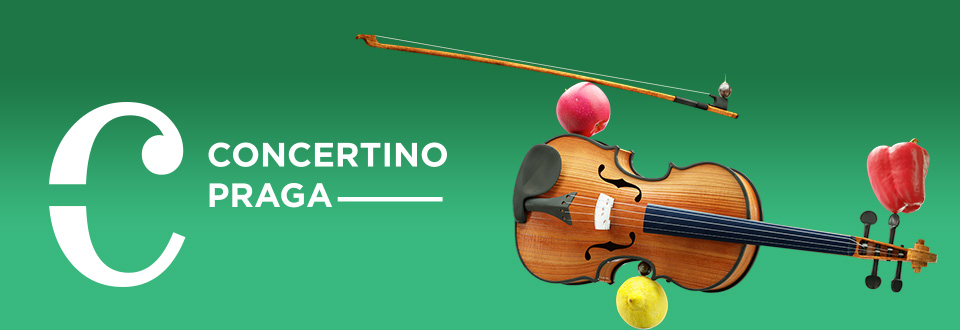Concertino Praga – the Antonín Dvořák International Radio Competition for Young Musicians
Concertino Praga – the Antonín Dvořák International Radio Competition for Young Musicians – has been held each year since 1966. The mission of this multidisciplinary competition is to find extraordinary talents up to age 16 or 18. It is jointly organised by Czech Radio and the Academy of Classical Music. In the first round, the jury evaluates the candidates anonymously on the basis of submitted recordings. The finals are held in public as a concert of the Dvořák Prague International Music Festival.
In the initial rounds, the jury evaluates participants anonymously based on submitted recordings. The final rounds are public and take the form of concerts held within the Dvořák Prague International Music Festival. The 2025 edition is open to two competition categories.
In the Solo Performance I category, the instrumental disciplines of piano, violin, viola, cello, harp, and accordion are eligible to compete.
In the Solo Performance II category, the eligible instrumental disciplines include flute, oboe, clarinet, bassoon, saxophone, trumpet, French horn, and trombone.
The winners will receive a scholarship in the amount of up to EUR 5,000. Laureates will also have the opportunity to make a professional radio recording at Czech Radio and to appear at the South Bohemia Festival Concertino Praga.
Since 1988, Concertino Praga has been a member of the European Union of Music Competitions for Youth (EMCY). It is held under the auspices of the European Broadcasting Union (EBU), of which Czech Radio became an active member in 1993.
History
Concertino Praga – the Antonín Dvořák International Radio Competition for Young Musicians – was founded in 1966 at the initiative of the Czechoslovak Radio editorial staff for broadcasting for children and young people. Among the leading figures in the initial development of the idea of a radio competition were the harpsichordist Zuzana Růžičková, the composer Viktor Kalabis, and the radio editor Helena Karásková. Thanks to the existence of the Organisation Internationale de la Radiodiffusion et Télévision, a former east-European institution that facilitated cooperation between radio and television stations, the competition was able to attain an international character and thus to differentiate itself from a large number of established national competitions for performing musicians.
In view of the complications associated with organising international activities under the former political regime, the decision was made to hold a competition without the direct participation of the competitors by only using submitted audio recordings. It was not until the concert that the winners were invited to appear together on one stage for the first time in history in the Dvořák Hall at the House of Artists in Prague on 18 November 1966, where the violinists Václav Hudeček (2nd prize) and Dmitry Sitkovetsky (1st prize) were among the now familiar artists presenting themselves.
The following year, Václav Hudeček won first prize, and among the pianists to win prizes were Dina Joffe and Zoltán Kocsis. Despite the competition’s necessarily strong orientation towards eastern Europe, among the laureates at the turn of the 1960s and ’70s were the Israeli violinist Yuval Yaron, a string quartet from West Germany (with Ulrike Fleming, Assunta Kwoka, Brigitte Schmeid, and Doris Laidler), a Japanese piano duo with Shizuka Ishikawa and Mariko Horie, and the Canadian pianists Louis Lortie and Jon Kimura Parker. Still today, there is an apparent tradition of candidates from eastern Europe – each year, Russian competitors usually represent the most numerous foreign nationality at Concertino.
While the competition was initially open to just three categories (piano, violin, and chamber music), the number of instruments gradually grew. For this reason, among the laureates were not only the violinists Sergei Stadler, Julian Rachlin, Isabelle Faust, and Jan Mráček and the pianists Vladimír Felcman, Igor Ardašev, and Ivo Kahánek, but also the cellists Leonid Gorochov, Alexander Rudin, and Tomáš Jamník, the organist Jaroslav Tůma, the flautist Michael Martin Kofler, the oboists Jana Brožková and Vilém Veverka, the clarinettists Sabine Meyer and Ludmila Peterková, the French horn player Radek Baborák, and the trumpet player Giuliano Sommerhalder.
The multidisciplinary and international character of Concertino Praga has been strengthened thanks to the establishment of cooperation between Czech Radio and the Academy of Classical Music in 2019. This has brought together the potential of the large media company that founded the competition and has been leading it successfully for more than 50 years, and of an institution that has been presenting the internationally recognised Dvořák Prague Festival for twelve years. The support for exceptionally talented young artists was thus able to take on a new form, and the 54th annual Concertino Praga competition gained the subtitle Antonín Dvořák International Radio Competition for Young Musicians. Dvořák’s legacy is reflected in the fact that the composer himself gave financial support to promising young artists. Successful contestants therefore receive scholarships or a contribution towards the purchase of their own instrument thanks to major support from the Karel Komárek Family Foundation and other partners.

